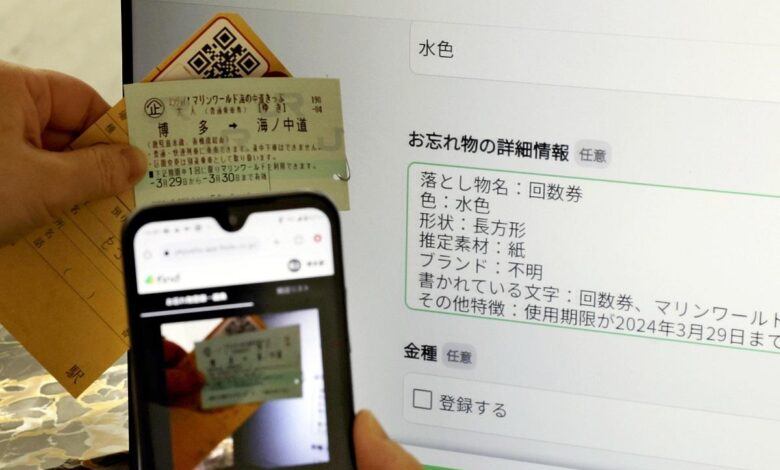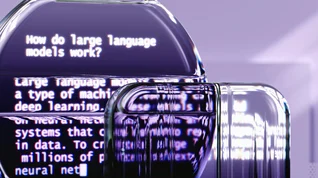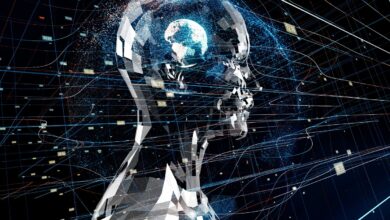Examining generative AI: Impact on society / AI Brings Benefits to Companies While Government Guidelines Bring Confusion; JR Kyushu Finds Innovative Uses for AI

A camera scans a lost item and converts the data to text at a lost and found center at JR Hakata Station in Fukuoka Prefecture on March 29.
16:00 JST, May 15, 2024
Expectations are high that generative AI will improve convenience in many ways, but confusion caused by the negative impact of generative AI is also spreading. This is the third installment of a series which explores issues and potential countermeasures in the fields of education, government, business, medicine and sports.
***
In late March, a station worker at the lost and found center in JR Hakata Station in Fukuoka Prefecture, which sees about 100,000 passengers every day, scanned a ticket that someone had turned in. A few seconds later, the following information appeared on a monitor:
“Lost property: A coupon ticket / Shape: Rectangular, Valid until March 29, 2024”
The camera was equipped with a generative artificial intelligence system capable of instantly determining the characteristics of lost property and converting that data into text.
Kyushu Railway Co. decided to implement the system, which was developed by the Tokyo-based startup find Inc., to improve work efficiency. Now, on a busy day, around 200 items are registered with the system.
“This latest technology has significantly lightened the workload for employees,” an official at JR Kyushu’s railroad business division said. “We want to make things more convenient at stations and improve work processes for our employees.”
On the other hand, one issue still needs to be addressed: The text that AI generates is not 100% accurate. Inaccurate information about items or brand names introduces the risk of an item being handed over to the wrong person, so a set of human eyes at the end of the process is essential.
Training rookies
Some companies are beginning to utilize AI for employee training.
Tokyo-based fixed-fee car leasing company Nyle Inc. uses AI to transcribe and summarize high-performing salespeople’s sales pitches and negotiations and share them with new employees in hope of increasing the company’s overall sales.
For onboarding, Nyle gets AI to score a new recruit’s responses to more than 100 questions related to conversations expected to take place with customers. The AI provides feedback such as “Your answer is suitable but needs a more detailed explanation.”
As a result of its company-wide implementation of AI, Nyle has saved around 2,500 hours and ¥40 million over the last year.
Active use
The use of AI in business operations is picking up speed. A survey conducted by MM Research Institute Ltd. in March found that 19% of the about 1,600 companies surveyed had implemented generative AI. The rate increases to 43% if companies that are considering implementing AI or preparing to do so are included.
On the other hand, such issues as copyright and personality right infringement resulting from the unauthorized use of certain materials in AI training are lingering risks.
Levi Strauss & Co. received a complaint from an American woman who claimed that the company used an AI-generated model based on her without permission and that her face had been altered by AI. The U.S. denim maker was forced to respond to criticism on social media that they were taking jobs away from real models.
AI-generated models are beginning to come into use in Japan too, but a person in a production company said: “Highly illegal things are also circulating in the market. Frankly, it’s a free-for-all.”
In April, the government finally issued guidelines for business operators regarding the use of AI, but one worker in a leading manufacturing company said, “The rules are vague about what we should be paying attention.”
Amid the continued expansion of AI in business, Chuo University Prof. Toshiya Jitsuzumi, an expert on AI issues, said that what has become important is the disclosure of information related to how AI is being used.
“Companies should disclose how and where AI is being used in their operations and whether the final decision is being made by a human being.” Jitsuzumi said. “Particularly because we’re in the early stages of AI expansion, it’s essential for companies to deal with risks appropriately and earn the public’s trust.”



